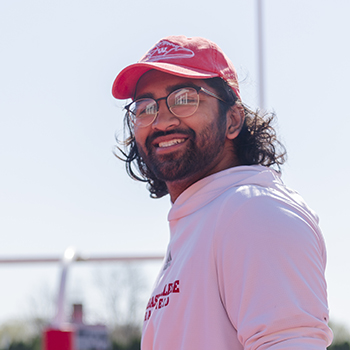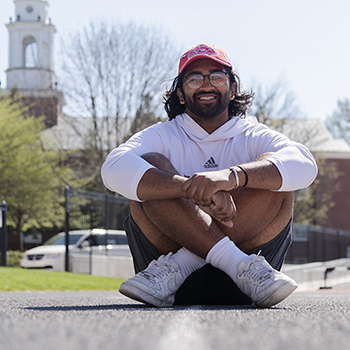There was no one moment when Evan Kanetkar ’24 realized he’d made the right decision to come to Wabash College.
Instead, it was a series of connections, friendships, and hearing students talk passionately about the culture on campus. It was fun, relationship-building moments in the Phi Kappa Psi house. It was his freshman tutorial, Caesar Builds Wabash: How Ancient Rome Can Help Us Design Our Next Campus Center, taught by Professor of Classics Jeremy Hartnett.
 A computer science major, Kanetkar is also interested in art—a passion that eventually steered him toward minoring in film and digital media.
A computer science major, Kanetkar is also interested in art—a passion that eventually steered him toward minoring in film and digital media.
The creative thinking that fueled Kanetkar’s interest in art has served him well during his time at Wabash. Hartnett vividly remembers Kanetkar’s involvement in his freshman tutorial, which taught students how built environments shape social interaction. For Kanetkar’s final project, he made a circle of benches in the middle of the mall and tracked how people reacted.
“It was typical of Evan, where it was both analytical and creative,” Hartnett said. “But it wasn't just for the sake of provoking the campus, it was also to see how people adjust the environment to suit their own needs.”
Hartnett, Kanetkar’s advisor, recalls meeting his advisee for the first time on Zoom.
“It was clear that Evan had a lot of gifts, but not much focus,” he said. “He just needed to find the thing or things that were going to turn it on.”
Kanetkar’s time at Wabash has been full of trying new things. He has been involved in Student Senate, the Malcolm X Institute of Black Studies, and the Diversity, Equity, and Inclusivity Committee.
The DEI Committee has been one his biggest learning experiences at Wabash. He laughed as he admitted he didn’t know what he was getting into when he joined, but he also acknowledged its impact.
“I learned how to manage my time better, how to approach things in a sensitive way, and how to understand people and talk to them,” Kanetkar said. “I gained a lot of valuable life experience in that role.”
As a senior, Kanetkar became a student-athlete with the track and field team. He had been the manager for two years when he approached Head Coach Clyde Morgan and asked what he could do to become more than a manager.
“I joined because I like the culture of the team and I wanted to experience it on a deeper level,” Kanetkar said. “He told me to put the work in over the summer. ‘Show me that you're dedicated to it.’ So that's what I did.”
Kanetkar began throwing javelin for the team. Kanetkar cites Coach Morgan’s three-part goal for his student-athletes as a major influence.
“We always talk about developing a young man first as his overall person,” Morgan said. “Second is teaching them how to work through life’s adversities, and the third is academics. You notice I didn’t talk about track and field there. If the first two aren't going well, you're going to struggle academically and on the track.”
Kanetkar says he spent much of his freshman year as “basically a hermit,” staying in his rooms and failing to find connection.
Ultimately, he found a place at the Malcolm X Institute of Black Studies.
“The MXI was pretty crucial to my personal growth,” he said. “That's where I found a safe space my sophomore year.”
The Malcolm X Institute is also where Kanetkar bonded with Kenny Coleman ’22, who was on the track and field team during Kanetkar’s time as manager. Coleman remembers Kanetkar as a creative thinker, combining his interest in technology with his love for track and field.
“Evan brought innovation to the team by bringing out a drone to capture different shots,” Coleman said. “He filmed some really cool moments during practice and meets. That's just how Evan thinks, he's a techie, artsy type guy.”

Kanetkar credits Coleman with helping him through the process of applying for and attaining an Orr Fellowship. Coleman, also an Orr Fellow, downplays his own role, pointing out that Kanetkar’s determination and drive were large factors in his success.
“He's not afraid of a challenge, to just go for it,” Coleman said. “The night before the final interview, I told him, ‘Just take a deep breath, man, you made it here. You're meant to be here.’”
Hartnett thinks the Orr Fellowship will be a perfect fit for Kanetkar.
“The people who picked him have seen his unique skill set, and they'll be better off with him in their orbit,” Hartnett said. “He's a good team player. He will offer creative solutions. At the same time, he will speak out—not to be an agitator, but because he wants to see things get better."
After graduation, Kanetkar’s Orr Fellowship will take him to Indianapolis, where he’ll work at Offprem, a company specializing in cloud-based Salesforce implementation services.
He looks forward to staying involved with the Wabash community and making regular visits back to campus to connect with students about the Orr Fellowship.
“You can leave Wabash,” he said, “but I don’t think Wabash ever really leaves you.”